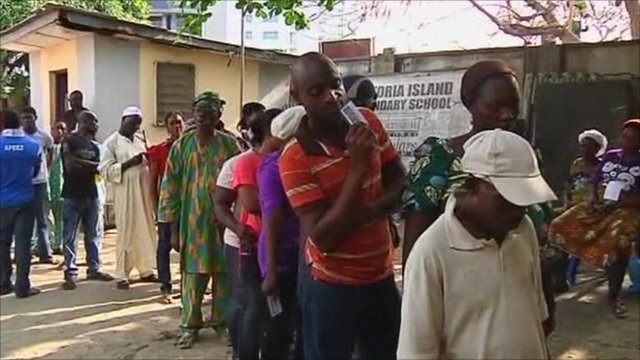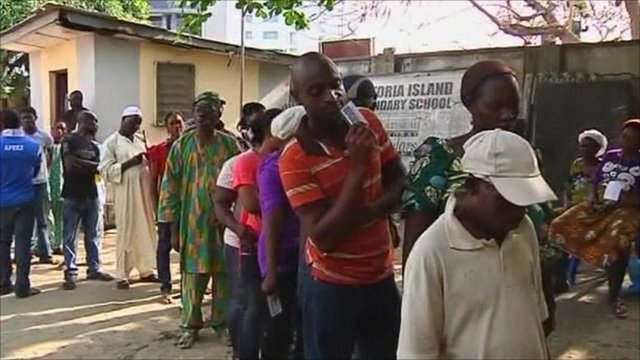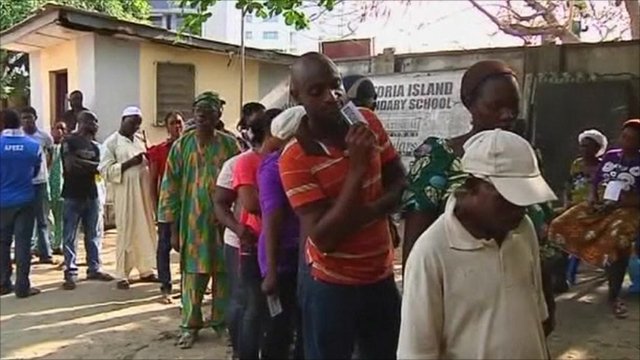Nigeria presidential election: Voting under way – Pictures & Analysis
Elections 2011, NNP Elections 2011 Updates, Top Stories Saturday, April 16th, 2011 Polling is under way in Nigeria’s presidential election, amid hopes of the freest and fairest vote there in two decades.
Polling is under way in Nigeria’s presidential election, amid hopes of the freest and fairest vote there in two decades.
Incumbent Goodluck Jonathan cast his ballot in his home state of Bayelsa in the oil-rich Niger Delta.
His main challenge is expected to come from Muhammadu Buhari, an ex-military leader popular in the north.
Before voting began, there were two explosions in the city of Maiduguri, though no injuries have been reported.
The polls close at 1700 (1600 GMT), but those already in the queue will be able to cast their vote, no matter how long it takes.
According to the law, counting should start immediately at the polling stations after everyone has voted.
‘Smooth start’
Mr Jonathan has staked his reputation on the conduct of the election, repeatedly promising it will be free and fair.
At the scene
With voting now under way across the country the early signs are encouraging; the organisation of this poll seems to have gone well.
In the relative cool of the early morning, long lines of voters began forming at the Sadiya Uku polling station here in Kano, the biggest city in the north.
A nearby main road to the airport, usually choked with cars and motorbikes, was virtually empty as residents obeyed the injunction not to drive on voting day.
After presenting cards for verification, each voter is required to return later in the day to actually cast their vote. It’s a slow process that will take most of this long, hot day.
But everyone is expressing the fervent hope that this poll with pass off peacefully and that the cheating and blatant ballot-rigging of previous polls are kept to a minimum this time.
After voting, he said the election was a “new dawn in Nigeria’s political evolution”.
“If the ballot paper means nothing then there is no democracy… Nigeria is now experiencing true democracy where we the politicians have to go to the people.”
Although the president enjoys huge popularity in the south of the country, he is sometimes characterised as a technocrat lacking in charisma.
He said he was confident of victory, but asked if he would leave office if he lost, he replied: “Of course.”
He said he hoped there would not be a run-off because elections cost a “colossal sum of money”.
“For economic reasons and to even to reduce tensions we pray that whoever should win should win at the first ballot.”
‘Model for Africa’
Africa’s largest oil producer has long been plagued by corruption and has a history of vote fraud and violence.
In north-eastern Maiduguri, an explosion tore through the election commission’s local office on Friday night, and there was another blast at a police station early on Saturday.
The city, in Borno state, was also hit by bomb blasts during the parliamentary election a week ago.
But elsewhere in Borno – one of Nigeria’s poorest areas – officials said the voter registration process was running smoothly.
Election Season
- 20 presidential candidates
- 74 million registered voters
- Parliament, president and local elections on three consecutive weekends
- Ruling PDP dominated every vote since end of military rule in 1999
- Previous elections plagued by corruption and violence
- New election commission head has promised clean vote
“Everything’s going well. People are co-operating, there is security, there are ballot papers. I think this is best election ever,” a presiding officer told the BBC.
Voters expressed hope that the election would be fairer than previous votes.
Williams Beacher, a voter in Kano, said he had confidence in the new election chiefs.
“In previous elections, before we finish casting our vote, the national result had already been announced,” he said.
Allegations of ballot-stuffing plagued the 2007 election, which brought Mr Jonathan to power as the vice-president.
He took over as president in 2010 when the incumbent died, becoming the first leader from the oil-producing Niger Delta region.
His other main challengers for the presidency are former anti-corruption chief Nuhu Ribadu and Kano state governor Ibrahim Shekarau, though both are seen as rank outsiders.
Increased confidence
Mr Jonathan’s People’s Democratic Party lost seats in a parliamentary election last week.
But he remains favourite in opinion polls, and his chances have been boosted after Mr Buhari and Mr Ribadu failed to agree a formal alliance to run against him.
Presidential Candidates
- Goodluck Jonathan, president – PDP
- Nuhu Ribadu, former anti-corruption fighter – ACN
- Muhammadu Buhari, former military ruler – CPC
- Ibrahim Shekarau, Kano governor – ANPP
- 16 others
The relatively successful conduct of the parliamentary election has increased confidence in the ability of the electoral commission, Inec, to ensure a fair presidential vote.
However, bomb blasts and other attacks killed dozens in the run-up to the polls.
With 74 million registered voters, Nigeria has the biggest electorate on the continent.
The head of the African Union’s observer mission, former Ghanaian President John Kufuor, said some shortcomings had been found with the election process but he was confident the electoral commission would resolve them.
“If Nigeria gets it right, it will impact positively on the rest of the continent and show the rest of the world that Africa is capable of managing its electoral processes,” said Mr Kufuor.
“If Nigeria gets it wrong, it will have a negative influence on the continent with dire consequences.”

The People’s Democratic Party (PDP) has won all elections since the end of military rule in 1999. It won two-thirds of Nigeria’s 36 states last time. But having a southerner – President Goodluck Jonathan – as its candidate in the presidential elections may lose it some votes in the north.

Nigeria’s 160 million people are divided between numerous ethno-linguistic groups and also along religious lines. Broadly, the Hausa-Fulani people based in the north are mostly Muslims. The Yorubas of the south-west are divided between Muslims and Christians, while the Igbos of the south-east and neghbouring groups are mostly Christian or animist. The Middle Belt is home to hundreds of groups with different beliefs, and around Jos there are frequent clashes between Hausa-speaking Muslims and Christian members of the Berom community.

Despite its vast resources, Nigeria ranks among the most unequal countries in the world, according to the UN. The poverty in the north is in stark contrast to the more developed southern states. While in the oil-rich south-east, the residents of Delta and Akwa Ibom complain that all the wealth they generate flows up the pipeline to Abuja and Lagos.

Southern residents tend to have better access to healthcare, as reflected by the greater uptake of vaccines for polio, tuberculosis, tetanus and diphtheria. Some northern groups have in the past boycotted immunisation programmes, saying they are a Western plot to make Muslim women infertile. This led to a recurrence of polio, but the vaccinations have now resumed.

Female literacy is seen as the key to raising living standards for the next generation. For example, a newborn child is far likelier to survive if its mother is well-educated. In Nigeria we see a stark contrast between the mainly Muslim north and the Christian and animist south. In some northern states less than 5% of women can read and write, whereas in some Igbo areas more than 90% are literate.

Nigeria is Africa’s biggest oil producer and among the biggest in the world but most of its people subsist on less than $2 a day. The oil is produced in the south-east and some militant groups there want to keep a greater share of the wealth which comes from under their feet. Attacks by militants on oil installations led to a sharp fall in Nigeria’s output during the last decade. But in 2010, a government amnesty led thousands of fighters to lay down their weapons.
wp_posts
Related Posts
- Protest in northern Nigeria over killing of Iran’s Ayatollah Ali Khamenei
- 2027: ‘I regret removing Jonathan’ — Atiku (No foresight, no vision – all regrets)
- Only 10 percent? – Wike expresses shock over voters turnout in FCT polls
- Senate passes Electoral Act Amendment Bill
- US to Deport 18 Nigerians on ‘Worst-of-the-Worst’ criminal list
Short URL: https://newnigerianpolitics.com/?p=6648



































